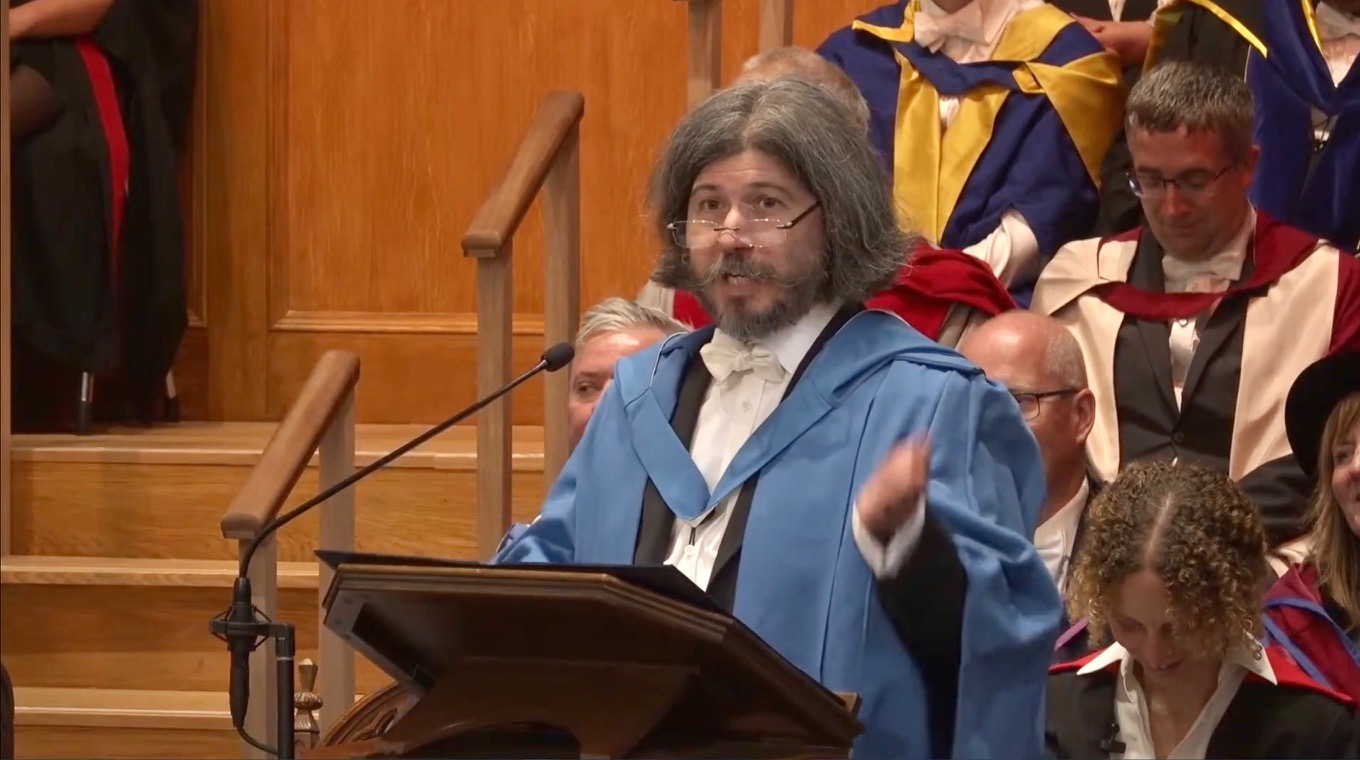Professor Jung emphasises the importance of philanthropy in his address to the University of St Andrews’ 2023 graduates
Professor Jung, Director of the Centre for the Study of Philanthropy & Public Good and Head of the University of St Andrews School of Management, has emphasised the importance of philanthropy, the use of private resources – talent, time, treasures, ties, and trust – for positive public purposes, in his address to the graduates of the Schools of Management, Classics, and Modern Languages today. Contextualising students’ experiences over the last few years, he said:
‘Chancellor, special guests, colleagues, graduates,
“It was the best of times, it was the worst of times, it was the age of wisdom, it was the age of foolishness,…it was the season of Light, it was the season of Darkness, it was the spring of hope, it was the winter of despair…”
These words from Charles Dickens’ A Tale of Two Cities seem to resonate very well with some of the experiences you will have had over the last few years. The excitement of coming to St Andrews and starting your degree; for then one of the world’s worst pandemics for centuries to hit. Meeting new companions and making new friends; then facing lock-down and isolation. Under-taking your studies and assessments; then being affected by one of the largest-ever higher education strikes in the UK. Never a dull moment. And all of this sits within the wider context of conflict, combat, and climate change – global challenges of a scale and complexity not seen for decades. Living the dream.
Yet, here we are. No matter what: true to the University’s motto, Ever to Excel, you have managed, you have succeeded, you have excelled. Alongside having the strength, resilience, and perseverance needed to arrive at this moment, you have also picked up invaluable life lessons and skills. You have learnt to become independent, critical, reflective, thinkers; you know how to approach, analyse, and provide answers to major questions and challenges that present themselves, no matter what they are. From looking at the past to gain an understanding of the present in Classics, to acquiring high-level language skills, essential for studying culture, in Modern Languages, and exploring, envisioning, and encouraging responsible, accountable, and sustainable practices in Management. In short, you have got a whole portfolio of accomplishments. Today is about celebrating all of these. Congratulations to all of you! Well done!
While we are celebrating your achievements, it is also important to recognise that your individual achievements simultaneously represent collective achievements: no person is an island. Yes, you are where you are today because of yourself, but also because of your families and friends, your foes and ‘frenemies’, your teachers and tutors. This recognition, of success being a collective rather than a solitary endeavour, is important as you move forward at a time of global polycrisis, a set of interlocking crises that are not going to be solved by anyone on their own. So, what can we do? How are we going to address this? Well, simple: go out, go forward, get the answers!
You have just spent three, four, or more years at St Andrews, developing your skills, aptitude, and proficiency in your respective field of study. Use this talent to tackle the social, economic, environmental, and political challenges ahead, whether that be through innovative problem-solving, artistic expressions, inspiring and empowering others, technological advancement, or scientific discoveries. Here, time is your most precious asset. Use it purposefully and with intention, for yourself and for others. Recognise and think carefully about the diversity of treasures that you have and that you can use – natural, cultural, human, social, political, financial. Use these resources for lasting positive impact on society. As part of this, nurture and leverage your ties, your relationships and connections, in ways that encourage inclusivity, collaboration, support, knowledge-exchange, and collective action. Finally, trust. Trust yourself; trust in others. Fragile and easily broken, trust requires respect, nurturing, and reciprocity to grow and flourish, but it is trust that has gotten you to where you are today.
Taken together, these five points provide the basis for philanthropy. By this, I do not mean the idea of fundraising or the passing of money from the rich to the poor, but the use of private resources – talent, time, treasure, ties, trust – for positive public purposes. Across time and space, philanthropy has repeatedly acted as a catalyst for change, as a force to be reckoned with and marvelled at, and as a way to think about conquering challenges. It provides you with a framework for collaboration and collective action, for education and empowerment, for advocacy and activism, for support and solidarity. Nobody is too poor to give; everybody has the resources to contribute to, and be a force for, good. As you join our global community of alumni, remember that it is true that you can go faster alone, but that you can go further together.
To conclude, I will draw on the words of the Scottish-born philanthropist and former Rector of this University, Andrew Carnegie. In his 1902 Rectorial Address to the Students of St Andrews, Carnegie, reflected that: “A peculiar charm is said to pervade everything with St Andrews…it is in the very air you breathe here”. Whatever that peculiar charm is that makes St Andrews distinctive, appreciate it, embrace it, and use it as you move ahead. For that, I wish you all the best.
Thank you.’
